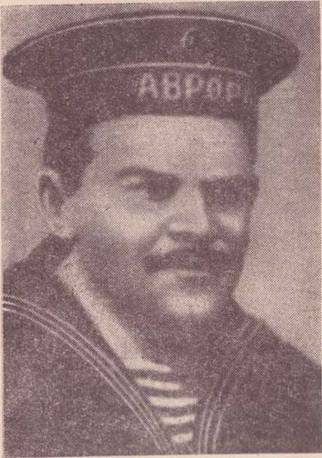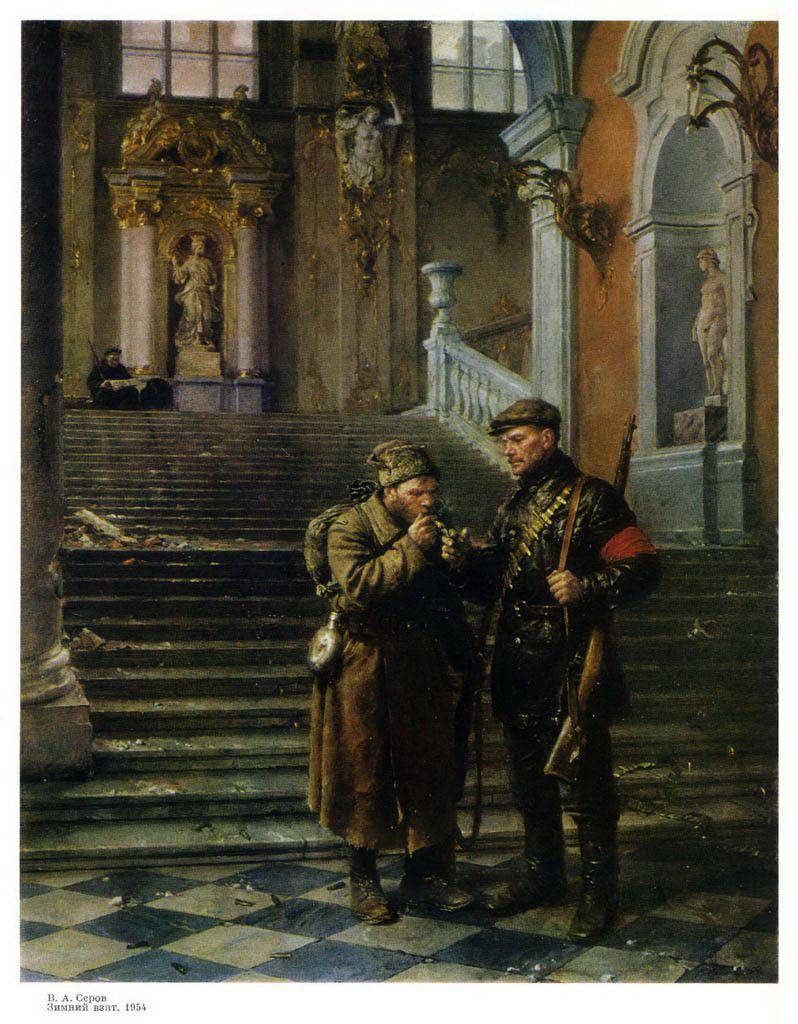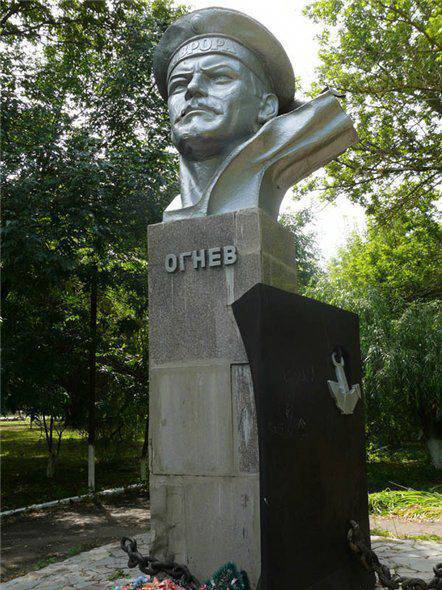The author of the historical shot

Our country is vast and immense. How many cities, villages, farms there are ... And each has its own story. And this little story is a grain of the history of a big mighty state.
There is a small rivulet in the Voronezh province, making many bends in its path. From the fact that the winding, and its name - Kriusha. In the 18th century 30, the settled Cossacks formed a village on the banks of the river, which was called Kriusha. Later, when a new one with the same name was formed near the village, the ancient settlement began to be called Old Kriusha, and the younger one - New.
Evdokim Pavlovich Ognev, commander of the Aurora cruiser, who fired a historic shot that served as a signal for the storming of the Winter Palace in October of 1887, was born here in 1917.
In Kriusha itself, the search for materials about a fellow villager was organized by the librarian E.A. Artamonov. Old-timers remembered the Ognev family, their relatives. It turned out that two cousins of Evdokim Ognev live in Old Kriush. The eldest of them, Maria Fominichna Ovcharova, said that Evdokim wrote all the time to his sister Pelagia Pavlovna from the fleet and from Don, where he fought. In 1918, from the detachment of Ognev, two fighters stopped by Pelageya Pavlovna, whom the commander gave his sister’s address.
Pavel Prokofyevich (Yevdokim Pavlovich’s father), a baker by profession, often moved from place to place in search of a better life with his family. Now it is authentically known that Ognjov after the Old Kriusha lived on the Third Log farm (now the Volgograd region), on the Popov farm, in the villages of Mikhailovskaya, Zotovskaya, and Velikoknyazheskaya (now Proletarian Rostov region).
Evdokim’s sister, Maria Pavlovna, told me that as a child, her younger brother had been missing on the river all day, he loved to arrange desperate “sea” battles with his peers on rafts, troughs, abandoned old boats. During one such “battle” on Manych, Fedotka’s elder brother sprained his leg, and Evdokim carried his home seven kilometers in his arms ...
In their spare time, friends often retreated somewhere on a forecastle or in a carpentry workshop and had secret conversations. Each talked about his life, native places. It was the turn of Yevdokim Ognev: “I listen to you, brothers, and I think: how our lives are like sores. It seems that her friend and her boyfriends peeped her ... Bata, Pavel Prokofyevich, was “lucky” all my life. The first wife soon died, leaving him a daughter Pelageya. He took the second from the neighboring village Novotroitskoye, Fedosya Zakharovna, my mother. Lived with the need for an embrace. Dad cakes baking, and we gulped kvass. In farms and villages in the county, in the Cossack villages they were driven around, they were looking for work. The father did not get along with the owners, the true lover had a reputation. Robbed on foreign corners - a family of eight mouths. I grew up, Dad conceived: “I will lie down with bones, and I will do the younger, Evdokim, with literacy, I will bring them into people.” And indeed, four winters went to the parish "university". The father didn’t endorse him, he waved his hand: “Do not fate, go, Evdokim, as day laborers.” When I knocked fifteen, I went for the best share in the Grand-Princely. Uncle Alex advised.
In military service Ognjov from 1910 year. Initially, he was a sailor of the Baltic Fleet, and after graduating from the school of commanders in 1911, he was sent to the cruiser Aurora.
From the memoirs of A.V. Belysheva, the former first commissar of the cruiser Aurora:
“October 25 1917 of the Year Aurora along the Neva River approached the Vasilyevsky Bridge and anchored. At dawn, thousands of Petrograd workers came to the embankment, welcoming sailors. Never before have such large warships entered the city so far.
The forces of the revolution multiplied and grew stronger. On the reduced bridge from Vasilyevsky Island, detachments of Red Guards and soldiers marched to the center of the city.
By morning, the entire city and its most important strategic points, apart from the Winter Palace, where the provisional government was hiding, were in the hands of the insurgent people. Towards evening, the tugboat approached the cruiser. The secretary of the Military Revolutionary Committee V.A. arrived at Aurora. Antonov-Ovseenko. He said that the provisional government presented an ultimatum - to surrender. Answer is expected before 9 hours. If the ultimatum is rejected, the revolutionary troops will take the Winter Palace, where the ministers took refuge, by storm. Antonov-Ovseenko warned that in this case fire would appear over the Peter and Paul Fortress. It will be a signal to the Aurora - to make a single shot at the Winter Idle, heralding the beginning of the attack to the detachments of Red Guards, sailors and soldiers.

In the storming of the last stronghold of the old world, the Aurorites also had to participate. About fifty seamen under the command of sailor A.S. Nevolina went ashore and joined the free squad of Baltic sailors. The decisive moment has come. Around 9 hours the crew of the cruiser raised the alarm signal. All took their places. Tension increased. Shooting came from the shore, and the Peter and Paul Fortress did not make itself felt. In the 35 minutes of the tenth signal all was not. And when the long-awaited fire broke out in the evening mist, it was already 9 hours 40 minutes.
- Nasal, please! - thundered the team.
Commander Evdokim Ognev pulled the trigger six-inch gun. Like a thunderclap ripped through the air over the city. Through the peals of the shot from Palace Square, he heard "Hurray!" Ours went to the assault. ”
In 1918, Yevdoky Pavlovich was sent at the head of the detachment to Ukraine to fight the enemies of the revolution, where he soon died in battle.
Memories of a participant in the events of P. Kirichkov: “When the whites surrounded the carts, they were greeted with rare shots by the paramedic and the Red Army rider. All of them, along with the wounded, were hacked to death, and they tied me with reins, threw the warriors to the bottom, and headed to the Jolly Farm to the chieftain. Krysin, a White Guard from the Cossack Homutts, with two fellow villagers rode near the cart in which I lay. The traitor boasted about the murder of the commander. I remember his story from beginning to end.
“... When the last supply left the village of Cossack Khomutets, there were three guns left: Ognev, his orderly and a limping Cossack by the name of Krysin from among those who joined the squad in the Cossack Khomutts. The shells ran out, an orderly brought the horses out of the girder, and three horsemen whistled toward the steppe under the whistle of White Guard bullets. While the whites realized that there was no one else in front of them, they brought the horses out of the shelter, the three horsemen continued to leave without hindrance. Chase rushed after them. Cossacks fired at a gallop. One bullet touched Ognev. Began to fall behind for some reason Krysin. When the horsemen reached the old Scythian mound, Krysin stopped the horse. He ripped the rifle off his shoulder and shot down the wounded Ognev. The orderly looked around, saw the commander fall, did not have time to understand anything - he was killed by the second shot. Krysin jumped off his horse, walked over to Ognev, turned him over with caution and began to take off his killed boots ... ”
Ognev was buried in a common grave on the Kazachiy Khomutets farm near Rostov-on-Don. He was also included by the Bolsheviks among the canonized heroes of October.
In his native village, the memory of the hero is still alive. A monument to Evdokim Pavlovich Ognev is installed in the village park. And the school museum contains a huge amount of information about a fellow countryman: parchments with memories of the participants in the events, portraits of Ognev and even a sleeve from the Aurora.

I often go to Old Kriusha. You walk through the park, you look at the erected monument, and it becomes warm at heart. How nice to know that this hero is your great-grandfather, and his personality has not been forgotten.
Information